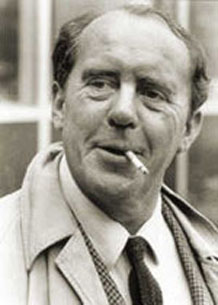
Böll started his first attempts to write in 1938 and gave private lessons.
Late in the summer of 1939 he was conscripted into the German Army shortly before the outbreak of the war. Conscripted into the Wehrmacht, he served in France, Romania, Hungary and the Soviet Union, and was wounded four times before he was captured by Americans in April 1945 and sent to a prisoner-of-war camp; later interned until October 1945 in a camp in France, and then for a few weeks in October-November 1945, in an English camp in Belgium.
Between 1950 and 1951 Heinrich worked as a temporary employee in the Cologne Bureau of Statistics. Böll was deeply rooted in his hometown of Cologne. However, the architecture of the newly-rebuilt Cologne left him indifferent. During all his life he maintained numerous relations with the Cologne citizens, rich and poor. In the post-war period, he was preoccupied with memories of the War and the effect it had on the lives of ordinary people, who became the heroes in his writing. His villains were the authority figures in government, business, and in the Church, whom he criticized. His simple style made him a favorite for German-language textbooks. When he was in hospital, the nurses often complained about the people who came to see their friend Heinrich Böll. The writer was a leader of the German writers who tried to come to grips with the memory of the war, the Nazis, and the Holocaust.
He was a president of the then West German P.E.N. and subsequently the International P.E.N. organizations. He travelled frequently as a representative of the new, democratic Germany. Böll was popular in Eastern Europe, as he seemed to portray the dark side of capitalism in his books. He sold millions of copies in the Soviet Union alone.
Heinrich Böll died in 1985 at the age of 67. He is considered to be one of Germany’s foremost post-World War II writers. The writer was awarded the Georg Büchner Prize in 1967 and the Nobel Prize for Literature in 1972. A special Heinrich Böll Archive was set up in the Cologne Library to hold his personal papers, bought from his family, but large amounts of the material were damaged, possibly irreparably, when the building collapsed in March 2009.
Selected works:
1947 – Kreuz ohne Liebe (published in 2000)
1949 – Der Zug war pünktlich
1950 – Wanderer, kommst du nach Spa
1951 – Nicht nur zur Weihnachtszeit; Wo warst du, Adam?
1954 – Haus ohne Hüter
1957 – Die Spurlosen
1962 – Ein Schluck Erde
1963 – Ansichten eines Clowns
1966 – Ende einer Dienstfahrt
1979 – Fürsorgliche Belagerung
1983 – Die Verwundung
1985 – Frauen vor Flusslandschaft
Related articles:
German Literature: From the Brothers Grimm to Contemporary Authors
Bertolt Brecht
Johann Wolfgang von Goethe
Friedrich von Schiller – the German Genius of Beauty and Freedom
Grimms’ Brothers Fairy Tales
E.T.A. Hoffman
